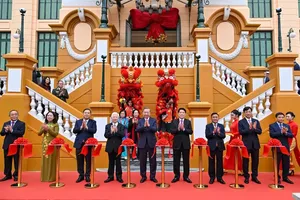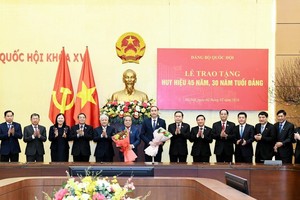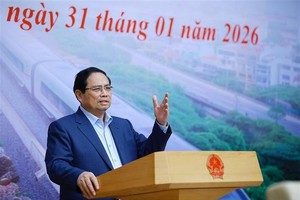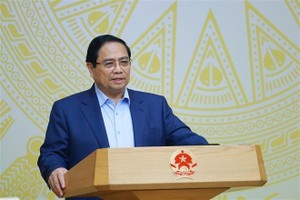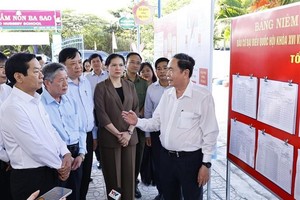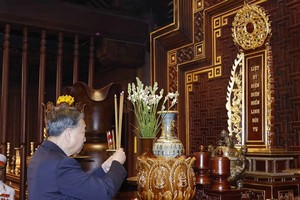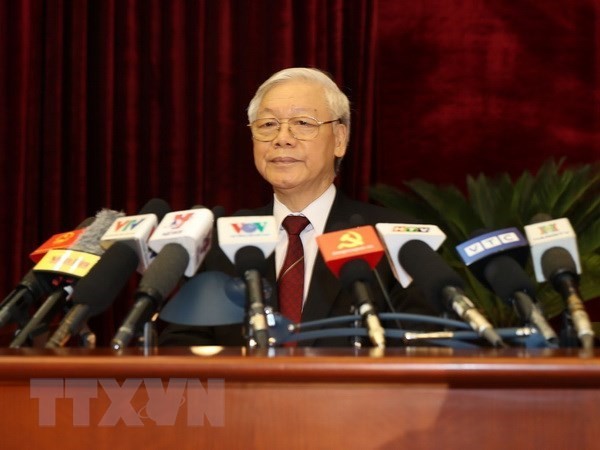
This determination was manifested in Resolution No.26-NQ/TW of the seventh plenary meeting of the 12th CPV Central Committee that wrapped up in Hanoi on May 12 and was signed into effect by Party chief Nguyen Phu Trong on May 19.
The resolution aims to build a contingent of officials, especially those at strategic level, who are capable of leading the country to become a modernity-oriented industrialised nation by 2030, with a vision to 2045 to become modern industrial nation, to realise the target of a wealthy people, a strong country, and an democratic, fair and civilised society.
The Resolution set specific goals for each period. By 2020, the Party will focus its efforts on building an exhaustive mechanism towards checks-and-balances of power, exercise utmost efforts in “total eradication” of obtaining positions in the Government and Party by illicit means such as nepotism and bribery, and prevent the “self-transformation” and “self-evolution” phenomena among Party members.
By 2030, the Party strives to build a professional and high-quality contingent of officials at all levels. It sets at least 40-50 percent of strategic-level officials must be capable of working in international environment besides conditions such as 15 percent of the contingent being under 45 years old, or all must be “truly exemplary in political ideology, virtuosity, qualifications, and reputation.”
Similarly, for the contingent of officials holding leader positions of general departments, departments at the central level, 20-25 percent must be under 40 years and 50-60 percent capable of working in international environment.
For local government’s leaders and officials, 15-20 percent of provincial leaders must be under 40 years old, 25-35 percent capable of working in international environment.
The contingent of commune-level officials must be 100 percent university/college graduates and has received standardised training on political thoughts, ideology, as well as their job’s skills and knowledge.
For the contingent of officials holding executive positions in State-owned enterprises, 70-80 percent of them must be capable of working internationally while upholding “Party’s ideology and the law-abiding spirit.”
The Party aims to have at least 11 scientists cum officials for every 10,000 people.
The proportion of female deputies at the National Assembly and People’s Councils at all levels is set to exceed 35 percent.
In areas with considerable presence of ethnic minority population, the ratio of the officials who are from local ethnic minority backgrounds must reflect respective demographic ratio, according to the Party Resolution."
The Resolution also highlights the Party’s two main priorities and five breakthroughs.
The first priority is to continue implementing robust and synchronous reforms, tightening disciplines and regulations while creating an environment conducive to innovation, creativity and commitments towards public service as well as developing mechanisms to protect officials who dare to think and act outside-of-the-box and dare to take responsibility for the common goods.
The second priority is to focus on developing the contingent of officials holding key leadership positions, especially Party secretaries, with an eye set on decentralisation of power in order to engender autonomy and innovation and prevent abuse of power.
The Party’s five breakthroughs include reforming official contingent assessment; maintaining a firm balance of power, filtering out and replacing unsuitable officials in a timely manner, putting an end to illicit bribery for positions in addition to enforcing serious implementation of the Party’s order that local government-level Party secretaries must not be locals.
Simultaneously is implementing public servants’ salary and housing reforms to create strong motivations for officials to be fully committed to their duties, and to craft policies and mechanism to enable a fair and competitive environment to draw in and make use of talents; and completing mechanisms to make sure that officials must maintain close ties with people and to promote the role of people in building a capable contingent of officials.-
